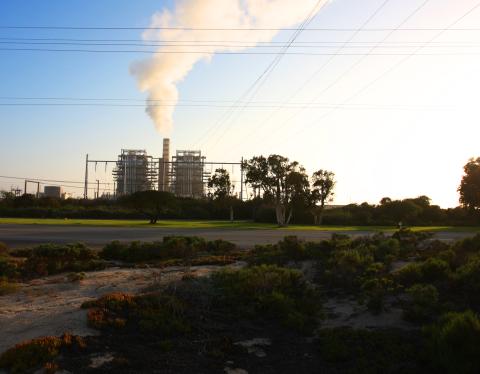Warrior Lawyer Profile: ClientEarth

Lauren Ferguson
Allard JD Candidate 2024
Jun 28, 2023
An Effective Collective of Environmental Lawyers
Do you experience climate anxiety – worry, hopelessness, or apathy in the face of the climate emergency? Though environmental injustice and the imminent threat of irreversible climate change are daunting realities, environmental law NGO ClientEarth is a beacon of hope.

A 2022 interview with ClientEarth founder, James Thornton, gives insight to the organization’s philosophy and purpose: to harness the power of law in the environmental movement. Specifically, ClientEarth aims to counter the norm of corporate lawyers and interests dominating the legal sphere with a simple idea: “represent the earth.”
Thornton started ClientEarth in the UK in 2007 when he noticed a legal gap in European environmental movements and organizations. Now ClientEarth has more than 250 employees, in over 50 countries, and its impact reaches far beyond its own work through collaboration, setting examples, and inspiring others to share this fundamental belief that law can effect global social change.
A Comprehensive Approach
ClientEarth advances environmental rights both through and in spite of law with its comprehensive three-pronged approach: it works to enforce, shape, and increase access to laws. That is, when strong environmental legislation or regulation already exists, ClientEarth works to enforce it by holding industry and governments to account while simultaneously striving to increase access to justice. As one example, ClientEarth campaigned successfully to expand public standing to challenge environmental decisions in European courts.
When the law is insufficient, as environmental law often is, ClientEarth pushes for laws and policies that account for the reality of climate change. ClientEarth applies this comprehensive strategy on a global scale while targeting a variety of specific environmental issues and priorities.
Snapshots of Success
The breadth, depth, and variety of the organization’s success is nearly impossible to encapsulate. ClientEarth is currently working on an impressive 168 legal cases. Their current and past projects range from advancing Indigenous rights at the United Nations to training the judiciary in China on environmental laws and, most recently, suing Shell’s Board of Directors for mismanaging climate risks and falling short of global emissions targets.
One instance of ClientEarth’s efforts to shape the law is its ongoing lawsuit about unsustainable European Union (EU) fishing quotas. This case comes on the heels of a decade-old broken promise by EU Member States to end overfishing by 2020. In late 2020, ClientEarth supported Friends of the Irish Environment who successfully argued in the Irish High Court for referral to the European Court of Justice, where this challenge will have further legal consequences. In March of 2023, ClientEarth finally made its case.

Simultaneously, ClientEarth works beyond the sphere of pure “environmental” law in corporate law, human rights law, and media, to empower environmental movements and serve its objective to “use the power of law to bring about systemic change that protects the earth for – and with – its inhabitants.”
These creative, unconventional approaches have proven immensely successful too. For instance, ClientEarth was able to utilize economic arguments and corporate law to prevent the construction of a coal-fired power plant in Poland. This was a novel case of shareholder activism: an environmental NGO challenging large scale fossil fuel investment on purely financial fallibilities and corporate law rather than environmental grounds.
ClientEarth’s anti-greenwashing work embodies all three aspects of its strategic use of the law. Through this campaign, it shapes and enforces the law, by arguing for stricter anti-greenwashing regulations and pushing for compliance, while promoting an underlying access to justice goal of protecting consumers from misleading advertisements. This demonstrates ClientEarth’s comprehensive approach through and beyond law. It understands the law as a powerful tool to mobilize environmental rights, while also recognizing the power of forces other than law – like the media’s ability to shape, reinforce, and shift ideologies – and in turn uses law to limit the misappropriation of this other force for change.
Lessons Learned
ClientEarth’s approach could be expanded and applied in many contexts to advance environmental rights through and in spite of law. Importantly, the organization spurs momentum beyond its own work by ensuring access to the law through education and activism. Laws are meaningless if not enforced, and there is “no point” to rights in theory alone if they are not realized.
Moving beyond shaping and enforcing laws to the crucial step of increasing access to justice on a global stage sets ClientEarth apart from other organizations and represents hope for strengthening the environmental rule of law. The approach of ClientEarth is a lesson to anyone looking to promote green rights both practically vis a vis its comprehensive systemic approach and theoretically through its underlying philosophy of harnessing the power of law to bring about change. Its impact and success over only sixteen years of existence is undeniably promising and exciting.
In one interview, James Thornton explains that reckoning with climate change requires a mental shift, a tremendous collective awakening. Perhaps ClientEarth’s approach is the wake-up call that will bring us out of the nightmare that is our current climate trajectory.
- Centre for Law and the Environment

